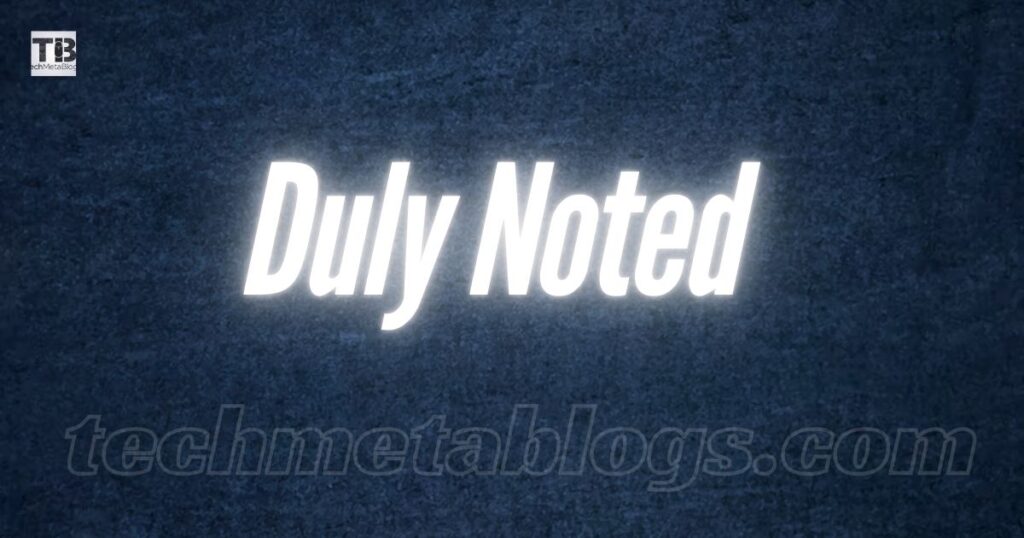In today’s fast-paced business world, how you acknowledge information in emails can make or break your professional relationships.
While “well noted” might seem like a safe choice, it often comes across as impersonal or dismissive.
Whether you’re wondering how to say noted in email or searching for another word for noted with thanks, this comprehensive guide will transform your email communication skills.
Is “Well Noted” Professionally Good to Use?

The phrase “well noted” has become increasingly controversial in professional settings. While it technically serves its purpose of acknowledging receipt, it can create an unintended barrier in workplace communication etiquette.
Many professionals find it overly formal or even cold, particularly in situations that require a more engaging response.
When considering how to say noted in formal way, remember that context matters significantly. The modern workplace values authentic, meaningful interactions, even in written communication.
An effective email acknowledgment should do more than simply confirm receipt – it should maintain the conversation’s momentum and strengthen professional relationships.
20 Professional Ways to Say “Well Noted” in Emails
Let’s explore alternatives that will enhance your business email responses and demonstrate your engagement in professional conversations.
1. “Thank You for the Update”
This phrase showcases both acknowledgment and appreciation, making it perfect for maintaining a professional tone in emails. It’s particularly effective when you want to say noted in email while keeping the conversation warm and engaging.
Example 1: Responding to a Project Status Update
Subject: Re: Q3 Marketing Campaign Progress
“Thank you for the update on our Q3 marketing campaign. The 15% growth in engagement metrics is particularly encouraging. I look forward to discussing these results in our next strategy meeting.”
Example 2: Acknowledging Changes in Event Planning
Subject: Re: Annual Conference Venue Change
“Thank you for the update regarding the venue modification. I’ll ensure all stakeholders are informed of this change and update our promotional materials accordingly.”
2. “Got It, Thanks!”
When workplace communication etiquette allows for a more casual tone, this acknowledgment strikes the perfect balance between professional and approachable.
3. “I’ll Ensure This Is Addressed”
This response demonstrates both acknowledgment and commitment to action, making it an excellent choice when you need to show proactive engagement in professional communication.
Example 1: Responding to a Customer Complaint
Subject: Re: Urgent – Customer Service Resolution Required
“I’ll ensure this is addressed immediately. I understand the customer’s concerns about our delivery timeline and will personally oversee the resolution. You’ll receive a detailed action plan within the hour.”
Example 2: Handling a Team Member’s Concern
Subject: Re: Project Resource Allocation Issues
“I’ll ensure this is addressed in our upcoming team meeting. Your observations about resource distribution deserve thorough discussion. I’m preparing a revised allocation plan for review.”
4. “Thank You for Bringing This to My Attention”
When seeking how to say this is noted in email while showing genuine appreciation, this phrase effectively acknowledges both the information and the sender’s initiative.
Example 1: Responding to a Potential Issue Report
Subject: Re: Security Protocol Vulnerability
“Thank you for bringing this to my attention. Your identification of this security concern is invaluable. I’ve already initiated a review with our IT security team to implement necessary safeguards.”
Example 2: Acknowledging Feedback on Process Improvements
Subject: Re: Suggestion for Customer Onboarding Enhancement
“Thank you for bringing this to my attention. Your suggested improvements to our onboarding process could significantly enhance customer satisfaction. Let’s discuss implementation details in our next operations meeting.”
5. “I’ve Recorded Your Details”
This phrase works particularly well when accuracy and attention to detail are paramount in your business email responses.
Example 1: Updating Contact Information
Subject: Re: New Department Contact Details
“I’ve recorded your details in our central database. All future communications will be directed to your new contact information. Please verify these details at your earliest convenience.”
Example 2: Confirming Event Registration
Subject: Re: Annual Leadership Summit Registration
“I’ve recorded your details for the upcoming summit. Your dietary preferences and accommodation requirements have been noted. Expect a detailed itinerary next week.”
6. “I Appreciate the Heads-Up”
This slightly more casual alternative maintains professionalism while adding a personal touch to workplace communication etiquette.
Example 1: Acknowledging Early Notice of Absence
Subject: Re: Advance Notice – Team Leave Request
“I appreciate the heads-up regarding your planned absence next month. This early notification helps us manage project timelines effectively. I’ll work on adjusting our delivery schedule accordingly.”
Example 2: Responding to a Potential Delay Warning
Subject: Re: Possible Supply Chain Disruption
“I appreciate the heads-up about potential supply chain issues. Your early warning allows us to develop contingency plans. I’m scheduling a risk assessment meeting for tomorrow.”
7. “I’ll Act Accordingly”
When demonstrating email communication skills that emphasize action and responsibility, this phrase shows both understanding and commitment.
Example 1: Responding to a Policy Change
Subject: Re: Updated Compliance Requirements
“I’ll act accordingly on these new compliance guidelines. The updated procedures will be implemented across all departments by next week. Expect a detailed rollout plan tomorrow.”
Example 2: Acknowledging a Shift in Project Priorities
Subject: Re: Project Reprioritization Request
“I’ll act accordingly to realign our team’s focus with these new priorities. The resource reallocation plan will be ready for your review by end of day.”
8. “Received and Will Proceed”
This concise yet effective phrase combines acknowledgment with action, perfect for situations requiring clear, direct communication.
Example 1: Confirming Receipt of Approval
Subject: Re: Green Light for Market Expansion
“Received and will proceed with the market expansion initiative. The implementation team has been notified, and we’ll begin executing the first phase immediately.”
Example 2: Acknowledging Go-Ahead for Hire
Subject: Re: New Position Approval
“Received and will proceed with the recruitment process. The job posting will go live today, and I’ll share the screening criteria for your review.”
9. “I Acknowledge Your Contribution”
This response elevates standard business email responses by explicitly recognizing the value others bring to the conversation. It’s particularly effective when you need to demonstrate appreciation for team efforts while maintaining professional tone in emails.
Example 1: Recognizing Input in a Group Project
Subject: Re: Team Innovation Proposal
“I acknowledge your contribution to our digital transformation initiative. Your insights on automation integration have provided a fresh perspective that could significantly improve our operational efficiency. I’m scheduling a meeting to explore these concepts further.”
Example 2: Appreciating Feedback on a Presentation
Subject: Re: Sales Pitch Feedback
“I acknowledge your contribution to refining our sales presentation. Your suggestions about incorporating client testimonials will strengthen our value proposition considerably. I’ll implement these changes before next week’s client meeting.”
10. “Duly Noted”

While seeking another word for noted with thanks, this classic phrase maintains formality while conveying careful attention to detail. It works especially well in situations requiring documented acknowledgment.
Example 1: Acknowledging a Formal Request
Subject: Re: Request for Extended Project Timeline
“Duly noted regarding your request for a timeline extension. I understand the complexities involved and will review this with the steering committee during tomorrow’s session. Expect our formal response by Friday.”
Example 2: Responding to a Compliance Reminder
Subject: Re: Annual Security Training Deadline
“Duly noted on the upcoming compliance deadline. I’ll ensure all team members complete their security training by the specified date. Weekly progress reports will be submitted to track completion rates.”
11. “I’m On It”
This dynamic response demonstrates both acknowledgment and immediate action, perfect for urgent situations requiring quick engagement in workplace communication etiquette.
Example 1: Responding to an Urgent Client Request
Subject: Re: Immediate Client Data Requirements
“I’m on it. The requested analytics report will be in your inbox within the next hour. I’ll prioritize the key metrics you’ve highlighted and include trend analysis for context.”
Example 2: Addressing a System Outage
Subject: Re: Critical System Performance Issues
“I’m on it. Our technical team has been mobilized to resolve the system degradation. Expect status updates every 30 minutes until full functionality is restored.”
12. “Consider It Done”
When looking for how to say noted in formal way while conveying confidence and commitment, this phrase effectively communicates both acknowledgment and assurance of completion.
Example 1: Responding to a Task Assignment
Subject: Re: Monthly Report Generation Request
“Consider it done. The comprehensive monthly performance report will be ready for your review by tomorrow morning. I’ll include the additional metrics you’ve requested along with comparative analysis.”
Example 2: Acknowledging a Request for Information
Subject: Re: Client Portfolio Analysis Request
“Consider it done. I’ll compile the requested portfolio data and prepare a detailed analysis by end of day. The report will include all specified performance indicators and risk assessments.”
13. “I Appreciate Your Input”
This phrase elevates standard email communication skills by explicitly acknowledging the value of others’ contributions while maintaining professional rapport.
Example 1: Responding to Constructive Criticism
Subject: Re: Project Management Process Feedback
“I appreciate your input on our current project management methodology. Your suggestions about improving our milestone tracking system are particularly insightful. I’m developing an implementation plan to incorporate these changes.”
Example 2: Acknowledging Team Member’s Idea
Subject: Re: Proposal for Customer Experience Enhancement
“I appreciate your input regarding customer experience improvements. Your suggestion about implementing automated feedback collection could revolutionize our service quality monitoring. Let’s discuss the technical requirements next week.”
14. “Thanks for Keeping Me in the Loop”
This phrase demonstrates effective corporate communication tips while maintaining a collegial tone. It’s particularly useful when acknowledging ongoing project updates or team communications.
Example 1: Responding to a Project Update
Subject: Re: Weekly Development Progress Report
“Thanks for keeping me in the loop on the development progress. The milestone achievements you’ve outlined show we’re tracking well against our objectives. Please continue these detailed updates as we approach the launch date.”
Example 2: Acknowledging Information About a Competitor
Subject: Re: Market Intelligence Update
“Thanks for keeping me in the loop regarding our competitor’s recent market moves. This intelligence will be valuable for our upcoming strategy review. I’ll incorporate these insights into our competitive analysis report.”
15. “I’ve Taken Note of This”
When considering how to say noted in email with gravitas, this phrase conveys careful attention and consideration of the information provided.
Example 1: Acknowledging Policy Changes
Subject: Re: Updated Remote Work Guidelines
“I’ve taken note of this comprehensive policy update. The revised guidelines will be implemented across my department immediately. I’ll arrange a team briefing to ensure full compliance with the new protocols.”
Example 2: Responding to Performance Feedback
Subject: Re: Quarterly Performance Review Notes
“I’ve taken note of this detailed feedback. Your observations about leadership development opportunities are particularly valuable. I’ll incorporate these suggestions into my professional development plan.”
16. “I’ll Factor This Into My Decision”
This response demonstrates sophisticated email communication skills by showing how the information will influence future actions.
Example 1: Responding to Budget Concerns
Subject: Re: Q4 Budget Allocation Concerns
“I’ll factor this into my decision regarding the Q4 budget distribution. Your insights about resource allocation constraints provide important context for our planning process. Expect a revised proposal by Friday.”
Example 2: Acknowledging Team Member’s Suggestion
Subject: Re: Organizational Structure Recommendation
“I’ll factor this into my decision about the department restructuring. Your suggestions about creating specialized teams align well with our efficiency goals. I’ll share the revised organizational chart once finalized.”
17. “This is Valuable Information”
When seeking another word for noted with thanks while emphasizing the importance of the communication, this phrase effectively conveys appreciation and recognition.
Example 1: Acknowledging Market Research
Subject: Re: Consumer Behavior Analysis Report
“This is valuable information for our product development strategy. The consumer preference data you’ve provided will directly influence our design decisions. I’ll share these insights with the R&D team immediately.”
Example 2: Responding to Customer Feedback Analysis
Subject: Re: Q2 Customer Satisfaction Trends
“This is valuable information about our customer satisfaction metrics. The identified pain points will help prioritize our service improvement initiatives. Let’s schedule a deep-dive session to analyze these findings.”
18. “I’ll Update You Once I’ve Reviewed This”
This response demonstrates professional tone in emails while setting clear expectations for follow-up communication.
Example 1: Responding to a Complex Proposal
Subject: Re: International Expansion Strategy
“I’ll update you once I’ve reviewed this comprehensive proposal. The market entry strategy you’ve outlined requires careful consideration. Expect my detailed feedback by next Wednesday.”
Example 2: Acknowledging a Long Report
Subject: Re: Annual Compliance Audit Findings
“I’ll update you once I’ve reviewed this detailed audit report. The compliance recommendations appear extensive and merit thorough analysis. I’ll schedule a meeting to discuss implementation priorities next week.”
19. “I’m Glad You Brought This to My Attention”
This phrase exemplifies effective email communication skills by showing genuine appreciation for the sender’s initiative while maintaining professional engagement. It’s particularly effective when noted on this email requires more than simple acknowledgment.
Example 1: Responding to a Risk Assessment
Subject: Re: Potential Security Protocol Vulnerabilities
“I’m glad you brought this to my attention regarding our security protocols. Your thorough risk assessment highlights critical areas requiring immediate action. I’ve already initiated a priority review with our cybersecurity team, and we’ll implement enhanced measures by week’s end.”
Example 2: Acknowledging a Customer Service Issue
Subject: Re: Recurring Customer Support Challenges
“I’m glad you brought this to my attention concerning our customer support processes. These recurring issues you’ve identified suggest a systemic problem that needs addressing. I’m convening a task force to develop comprehensive solutions.”
20. “I’ll Circle Back After I’ve Processed This”

When considering how to say notes in a formal way, this phrase effectively communicates thoughtful consideration while setting clear expectations for follow-up engagement.
Example 1: Responding to a Complex Data Analysis
Subject: Re: Market Penetration Strategy Data
“I’ll circle back after I’ve processed this extensive market analysis. Your data-driven insights deserve careful consideration to maximize our strategic planning. Expect my detailed response by Thursday, including specific action items.”
Example 2: Acknowledging a New Strategic Initiative
Subject: Re: Proposed Digital Transformation Framework
“I’ll circle back after I’ve processed this innovative transformation proposal. The scope of changes you’ve outlined requires thorough evaluation against our current capabilities. I’ll schedule a discussion next week to explore implementation feasibility.”
Conclusion
Mastering alternatives to “well noted” transforms routine email exchanges into opportunities for meaningful professional engagement.
By selecting thoughtful acknowledgments that match each situation’s context, you demonstrate both attentiveness and professional courtesy.
These carefully chosen responses do more than simply confirm receipt—they build trust, strengthen workplace relationships, and showcase your communication expertise.
Remember that effective professional communication combines clear acknowledgment with appropriate action and follow-through. As you incorporate these alternatives into your daily communications, you’ll notice enhanced engagement from colleagues and stronger professional relationships.
The key lies not just in choosing different words, but in demonstrating genuine engagement with every interaction. Your thoughtful responses today build the foundation for successful professional relationships tomorrow.













